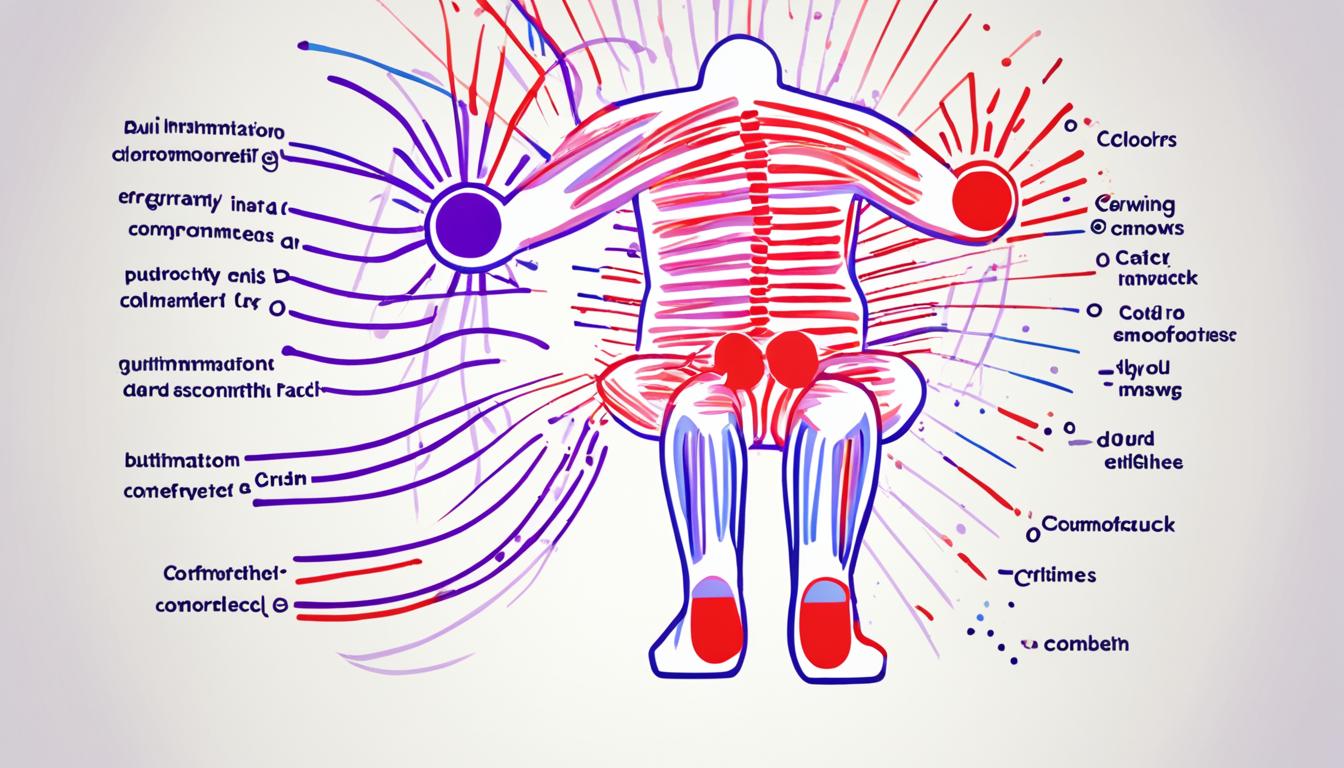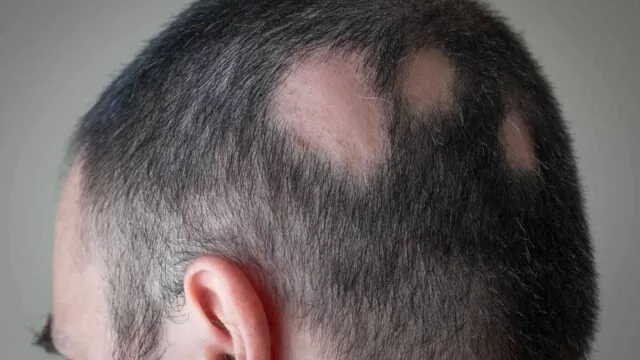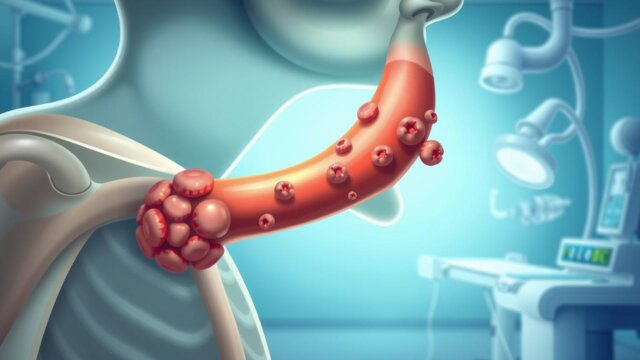FTC disclaimer: This post may contains affiliate links and we will be compensated if you click on a link and make a purchase.
Did you know up to 35% of pregnant people might get hemorrhoids? Hemorrhoids, or piles, are common and can be quite uncomfortable. They affect the lower rectum and anus. These swollen veins can cause mild to severe pain, affecting your life a lot. We’ll cover the causes, symptoms, prevention, and treatment options for hemorrhoids in this guide. This way, you can manage your anorectal health better.
Hemorrhoids are a venous disorder where veins in the lower rectum and anus swell and get inflamed. Factors that increase the risk include aging, sitting a lot, chronic diarrhea or constipation, being overweight, pregnancy, anal sex, eating too little fiber, and lifting heavy things. Hemorrhoids can be inside the rectum or outside under the skin around the anus.
Key Takeaways
- Hemorrhoids are a common condition affecting the lower rectum and anus, causing swollen veins and a range of symptoms.
- Risk factors for hemorrhoids include aging, sitting for long periods, chronic digestive issues, obesity, pregnancy, and a low-fiber diet.
- Complications of hemorrhoids, though rare, may include anemia, strangulated hemorrhoids, and painful blood clots.
- Lifestyle changes, such as increasing fiber intake and exercise, can help prevent and alleviate hemorrhoid symptoms.
- Various treatment options are available, from over-the-counter remedies to non-surgical and surgical procedures.
What are Hemorrhoids?
Internal and External Hemorrhoids
Hemorrhoids are swollen veins in the lower rectum and anus. They can be inside the rectum (internal) or under the skin around the anus (external). Internal ones are inside the rectum and don’t usually hurt but can bleed when you go to the bathroom. External ones are under the skin and can hurt, itch, and bleed. Thrombosed hemorrhoids happen when a blood clot forms in an external one, causing a lot of pain and swelling.
About 1 in every 20 people in the U.S. has hemorrhoids. Over half of people over 50 get them. Older people are more likely to get them because their tissues get weaker. Being born with them and being pregnant can also make you more likely to get them.
Hemorrhoids are either external or internal. External ones are under the skin around the anus, and internal ones are in the lining of the anus and lower rectum. Things like straining when you go to the bathroom, sitting too long on the toilet, constipation or diarrhea, eating too little fiber, and lifting heavy things can cause them.
“Hemorrhoids are very common and most people will have a hemorrhoid at some time in their life.”
Hemorrhoid Symptoms
Hemorrhoid symptoms can vary a lot, based on the type and how bad they are. Internal ones usually don’t hurt but can cause bleeding when you go to the bathroom. External ones can make the area around your anus itch, hurt, swell, and get red. If internal ones push out, they can be uncomfortable and hurt. External ones that get worse can turn into a hard, red bump near your anus, which is very painful.
Some common signs of hemorrhoids include:
- Bright red blood after you go to the bathroom
- Itching around your anus
- Feeling like you need to go to the bathroom even after you already have
- Mucus in your underwear or on toilet paper after cleaning yourself
- Seeing lumps around your anus
- Pain around your anus
The severity of symptoms can be mild or severe, and it depends on the type of hemorrhoid. Hemorrhoids are ranked from 1 to 4 based on how much they stick out, with higher numbers meaning worse symptoms.
If you notice any of these symptoms, you should see a doctor. Some cases need treatment to make you feel better and prevent more problems. It’s very important to get medical help right away if you have bleeding that won’t stop or if the pain is very bad.
Causes of Hemorrhoids
We don’t know all about why hemorrhoids happen, but we know some things make them more likely. Straining when you go to the bathroom, often from constipation or diarrhea, can make veins swell. Being pregnant, getting older, being overweight, lifting heavy things, and certain activities can also make hemorrhoids more likely. Eating less fiber and sitting a lot, especially on the toilet, can also cause them.
Risk Factors for Developing Hemorrhoids
- Constipation and diarrhea
- Pregnancy
- Obesity
- Aging
- Heavy lifting
- Anal intercourse
- Low-fiber diet
- Prolonged sitting, especially on the toilet
Studies show that many people have hemorrhoids and often constipation. Doctors can only correctly diagnose about 47-52% of anal problems.
Risk Factor | Impact on Hemorrhoids |
|---|---|
Constipation and diarrhea | Straining during bowel movements can put pressure on the veins in the lower rectum, causing them to swell. |
Pregnancy | Increased pressure on the rectum and anus can lead to the development of swollen hemorrhoids. |
Obesity | Increased pressure on blood vessels can contribute to the development of hemorrhoids. |
Aging | The prevalence of hemorrhoids increases with age, with about half of people over 50 having inflamed hemorrhoids. |
Heavy lifting | Increased pressure on internal organs can cause hemorrhoid blood vessels to swell. |
Anal intercourse | Can irritate and worsen existing hemorrhoids, leading to symptoms like bleeding and discomfort. |
“Hemorrhoid symptoms can clear up in a few days in some cases, but can persist with regular flare-ups.”
External hemorrhoids look like small bumps or lumps around the anus. They can happen more often if you have chronic constipation or diarrhea.
Sitting for a long time on the toilet can also lead to hemorrhoids. So can lifting heavy things, which puts pressure on your internal organs.
Complications of Hemorrhoids
Hemorrhoids are usually not a big deal but can sometimes cause problems. By age 50, about half of adults have had hemorrhoid symptoms. Internal ones don’t hurt because they don’t have nerve endings. But, they can be found when they start bleeding.
Sometimes, hemorrhoids can lead to serious issues. These include fecal soiling, feeling like you didn’t fully go to the bathroom, and more. Rare cases can also cause anemia from losing a lot of blood, skin tags, and strangulated hemorrhoids with severe pain.
Loss of blood from hemorrhoids can lead to anemia and a lack of red blood cells. Strangulated hemorrhoids cut off blood supply and cause a lot of pain. Blood clots can also form, making the situation worse.
In rare cases, hemorrhoids can get infected or cause urinary retention.
If you have a lot of rectal bleeding and feel faint, you should see a doctor right away. Other signs that mean you need help include mucus or pus from the rectum, fever, and more. If you have itching, swelling, and pain that gets worse after treatment, you should get medical help too.
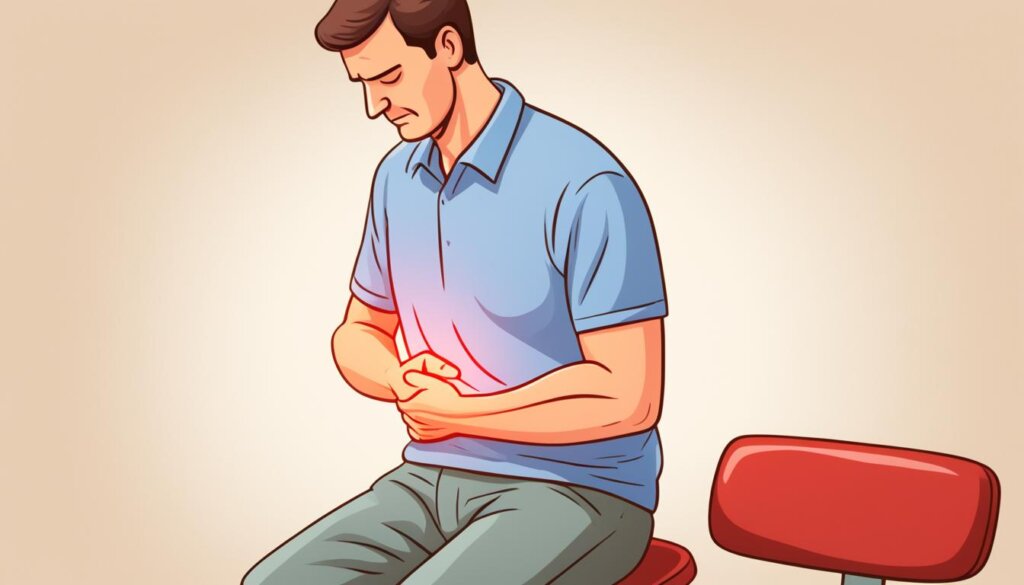
In summary, while hemorrhoids are usually not dangerous, they can cause serious problems. It’s important to see a doctor if symptoms get worse or don’t go away. This helps manage the issue better.
Home Remedies for Hemorrhoid Relief
Many people find relief from hemorrhoid symptoms with simple home remedies. Using creams or ointments with witch hazel or hydrocortisone can ease swelling, pain, and itching. Taking warm baths for 15 minutes, two or three times a day can also help.
Dietary Changes for Hemorrhoid Prevention
Eating a high-fiber diet and drinking plenty of water is key to preventing and managing hemorrhoids. Aim for 20-35 grams of fiber daily to soften your stool. Drinking water keeps your stools soft and easy to pass. Fiber supplements like psyllium or methylcellulose can also be helpful.
Regular brisk walking for 20-30 minutes daily can prevent constipation and ease the strain on your veins. Natural laxatives, such as prune juice, can help with bowel movements and prevent straining. But, increase fiber slowly to avoid gas and bloating. Avoid sitting on hard surfaces for a long time to reduce swelling and prevent new hemorrhoids.
Hemorrhoids often clear up on their own in a week. Using different home remedies can help with relief and prevent them from coming back. Aloe vera, witch hazel, and other natural remedies can reduce inflammation and aid healing.
If home remedies don’t work or if symptoms get worse, see a healthcare professional. It’s important to get medical help if you have rectal bleeding, dizziness, or other serious symptoms.
By making dietary changes, using over-the-counter treatments, and trying home remedies, many people can find relief from hemorrhoid symptoms. This can also help prevent future problems.
Over-the-Counter Hemorrhoid Treatments
If home remedies don’t help with your hemorrhoids, you can try over-the-counter (OTC) hemorrhoid treatments. These include hemorrhoid creams, ointments, and pads with things like zinc oxide, witch hazel, hydrocortisone, and lidocaine.
Zinc oxide can ease irritation, and witch hazel might give you some relief. Corticosteroids like hydrocortisone can lessen swelling, and lidocaine helps with pain. You can also use OTC pain relievers like aspirin, ibuprofen, and acetaminophen for relief.
Some popular OTC hemorrhoid treatments include:
- Preparation H Soothing Relief Anti Itch Cream with 1% hydrocortisone, use for one week unless a doctor says otherwise.
- ANUSOL Plus Hemorrhoidal Ointment with zinc oxide and pramoxine for external hemorrhoids.
- TUCKS Medicated Cooling Pads for cooling relief of pain and irritation.
- Motherlove Postpartum Rhoid Balm for quick relief, with effects felt after just one day.
- Thena Natural Wellness Organic Sitz Bath Soak for 2 to 3 soaks per day, 10 to 15 minutes each time.
- Fleet Laxative Glycerin Suppositories to help with internal hemorrhoids and constipation.
The effectiveness of OTC hemorrhoid medications can vary. Preparation H can be used up to four times a day, and Tucks up to six times a day. If you don’t see improvement in seven days, see a doctor.
Non-Surgical Procedures for Hemorrhoids
If home and over-the-counter treatments don’t help, your doctor might suggest non-surgical procedures. These options can treat both internal and external hemorrhoids without surgery.
Rubber Band Ligation
Rubber band ligation is a common way to treat internal hemorrhoids. It puts a small rubber band on the hemorrhoid to cut off its blood supply. This makes the hemorrhoid shrink. The procedure is done in an office and takes just one visit.
Sclerotherapy
Sclerotherapy is another way to treat internal hemorrhoids. It injects a solution into the hemorrhoid to create scar tissue. This reduces blood flow to the area. The procedure is done in an office under local anesthesia.
Infrared Photocoagulation
Infrared photocoagulation uses infrared light to heat and scar internal hemorrhoids. This stops their blood supply. It’s an outpatient treatment done in several sessions.
These treatments are seen as the “new gold standard” for managing hemorrhoids. They offer relief without surgery. Plus, they’re cheaper than traditional surgery, which can cost from $5,000 to $15,000.
If you have ongoing or severe hemorrhoid issues, talk to your doctor. They can help you choose the best non-surgical option. They’ll guide you to make a well-informed decision.
Surgical Treatment Options for Hemorrhoids
Home remedies and non-surgical treatments help many people with hemorrhoids. But, sometimes, surgical treatments are needed for severe or ongoing cases.
A common surgery is a hemorrhoidectomy, which removes external or prolapsed hemorrhoids. Another method, stapled hemorrhoidopexy, moves prolapsed internal hemorrhoids back in place.
These surgeries are done under anesthesia, and most people go home the same day. Recovery takes about 2 weeks, but it can take up to 3 to 6 weeks to feel fully well.
Surgical Procedure | Key Benefits | Potential Drawbacks |
|---|---|---|
Hemorrhoidectomy | – Highly effective for severe or recurring hemorrhoids – Relieves symptoms like bleeding, pain, and prolapse | – Longer recovery time – Higher risk of complications like bleeding, infection, and difficulty urinating |
Stapled Hemorrhoidopexy (PPH) | – Faster recovery with less pain, bleeding, and itching – Preserves more of the normal anal anatomy | – Higher risk of hemorrhoids recurring or rectal prolapse – Potential for complications like fecal incontinence |
Hemorrhoidal Artery Ligation (HAL-RAR) | – Minimally invasive procedure – Virtually painless with effective results within weeks | – May not be suitable for severe or prolapsed hemorrhoids |
These surgical treatments are usually safe and work well, but problems can happen. These include bleeding, infection, reactions to anesthesia, and issues with urination after surgery. Surgery can also cause fecal incontinence or bowel leaks.
If you have big bleeding, can’t urinate, or have a fever after surgery, call your doctor right away. Surgical options are a good solution for serious or ongoing hemorrhoids. But, they have risks that should be thought over carefully.
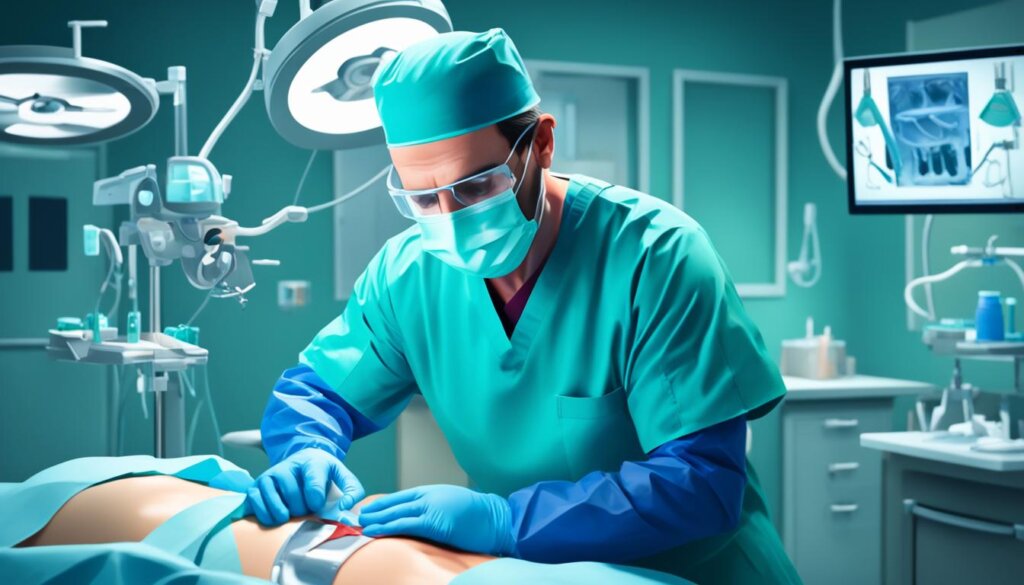
Diagnosing Hemorrhoids
If you have symptoms that might be from hemorrhoids, your doctor will check you over and look at your health history. They will look at your anus and the area around it to see if you have external or internal hemorrhoids, skin irritation, or other problems. They might also do a digital rectal exam to check the muscles, feel for tenderness, and see if there are any internal issues.
Grading Internal Hemorrhoids
If your doctor thinks you have internal hemorrhoids, they might use an anoscope to see better. They will grade these hemorrhoids from 1 to 4 based on how much they stick out. Grade 1 is the least severe, and Grade 4 is the most severe, sticking out all the time. Sometimes, they might use sigmoidoscopy or colonoscopy to check for these hemorrhoids if there’s bleeding or other issues.
Hemorrhoid Grade | Description |
|---|---|
Grade 1 | Hemorrhoids that bleed but do not prolapse |
Grade 2 | Hemorrhoids that prolapse with bowel movements but can be pushed back in |
Grade 3 | Hemorrhoids that prolapse and cannot be pushed back in |
Grade 4 | Hemorrhoids that are constantly prolapsed and cannot be pushed back in |
Getting the right diagnosis helps your doctor know how to treat your hemorrhoids. They might use a visual exam, digital rectal exam, or an anoscope to find the best way to help you.
“Proper diagnosis is key to effectively treating hemorrhoids and getting relief from uncomfortable symptoms.”
Preventing Hemorrhoids
Changing your lifestyle can help prevent hemorrhoids or reduce their risk. Eating a fiber-rich diet is key to stopping hemorrhoids. Foods like fruits, veggies, and whole grains make your stools soft and regular.
Drinking enough water is also vital for avoiding hemorrhoids. It makes your stools soft and easy to pass, which helps prevent hemorrhoids.
Exercise is great for your digestive health and for stopping hemorrhoids. Walking is a good exercise that keeps waste moving and lowers constipation risk. But, avoid heavy weight-lifting that puts pressure on your belly.
Keeping a healthy weight is key to avoiding hemorrhoids. Being overweight adds pressure to your anal area, making hemorrhoids more likely.
Don’t sit for a long time, especially on the toilet, to prevent hemorrhoids. Using a stool or chair to lift your feet can ease pressure and cut down on straining.

By following these easy steps, you can stop hemorrhoids before they start and keep your digestive system healthy.
Hemorrhoids During Pregnancy
Hemorrhoids are swollen veins in the rectum and anus. They happen to up to 35% of pregnant people. The growing uterus and fetus put pressure on veins, making them swell and get irritated. Women who had them before pregnancy are more likely to get them again. They can also happen after birth from pushing during labor.
To stop and manage hemorrhoids, eating right is key. A diet high in fiber helps prevent constipation, which can cause hemorrhoids. But, some vitamins like iron can make constipation worse. So, always ask your doctor about safe fiber supplements and stool softeners. Drinking plenty of water and exercising regularly can also help ease symptoms.
If hemorrhoids don’t get better or get worse, see a healthcare provider. They can suggest treatments like creams or suppositories, or more serious options if needed. Acupuncture can also help. But, use relief products for only a week to avoid skin problems. For many women, they go away after giving birth. But, surgery might be needed if they don’t.
Hemorrhoids are most common in the last part of pregnancy and right after childbirth. Up to 50% of pregnant women get them. Fixing constipation and keeping good bowel habits can help prevent and treat them. If your hemorrhoids keep getting worse, talk to your healthcare provider for help and treatment.
In summary, hemorrhoids are common in pregnancy but can be managed. Eat foods high in fiber, drink lots of water, and get medical advice if needed. Taking steps early can help you feel better and take care of your health.
When to See a Doctor for Hemorrhoids
Most hemorrhoid symptoms can be treated at home or with over-the-counter products. But, seeing a healthcare provider is important if you have ongoing or heavy bleeding, severe pain, or other worrying signs. Rectal bleeding could also mean other health issues, like cancer, so it’s important to get it checked out.
If you have a lot of rectal bleeding, feel dizzy, lightheaded, or have a fever, get help right away. These could be signs of a serious problem. Internal hemorrhoids usually heal by themselves. But, external ones can be painful and cause bleeding, itching, and swelling.
When you need medical help for hemorrhoids, look out for bleeding, constant pain, changes in stool color, and a lump in the anus. Doctors might do a digital rectal exam or anoscopy. They might also use flexible sigmoidoscopy or colonoscopy if needed.
Symptom | Indication |
|---|---|
Rectal bleeding | Possible hemorrhoids or other condition |
Constant pain | Possible severe hemorrhoid or other issue |
Stool color changes | Possible underlying health concern |
Anal lump growth | Possible hemorrhoid or other condition |
It’s important to see a doctor for hemorrhoids to get the right treatment, check for serious problems, and stop future flare-ups.
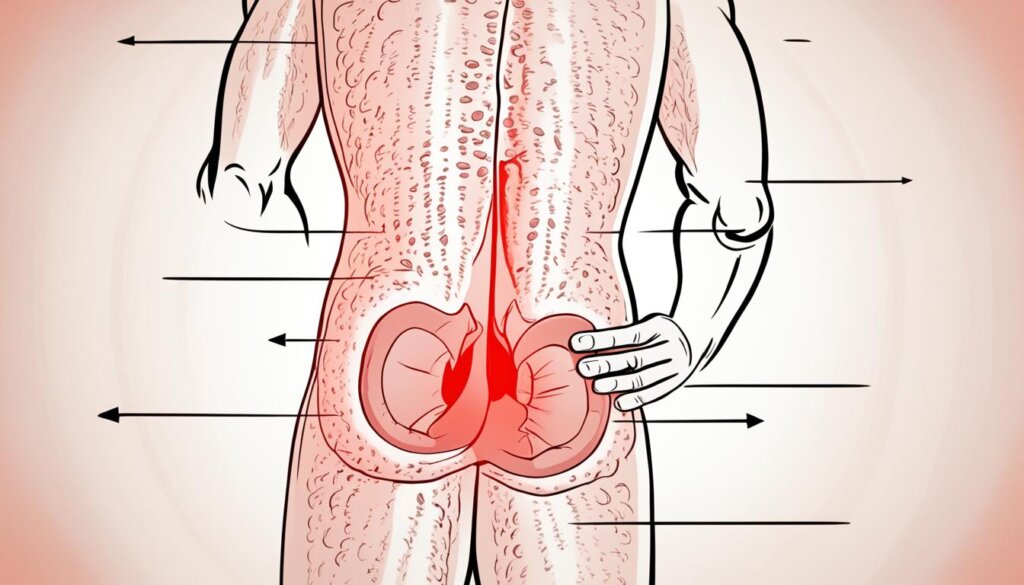
Always choose safety over risk with your health. If you’re worried about your hemorrhoids or any rectal issues, don’t wait to talk to a doctor.
Outlook and Prognosis for Hemorrhoids
The outlook for hemorrhoids is usually good, but they can come back. Most people can manage their symptoms with treatments. About 50% of people see them come back within 5 years. But, surgery can lower this chance to less than 5%.
Sometimes, hemorrhoids can lead to serious issues like bleeding or infection. But, with the right treatment and changes in lifestyle, most people can handle their symptoms well. Eating more fiber, staying regular, and using sitz baths can help prevent and ease symptoms.
If home treatments don’t work or symptoms are bad, see a doctor. They can figure out what’s best for you. This might be non-surgical or surgery, based on how bad your condition is. With the right treatment, you can feel better and live a good life again.
FAQ
What are hemorrhoids?
Hemorrhoids are swollen veins in the lower rectum and anus. They can be inside the rectum (internal) or under the skin around the anus (external).
What are the symptoms of hemorrhoids?
Symptoms vary by type. Internal ones don’t hurt but can bleed during bowel movements. External ones cause itching, irritation, pain, and swelling around the anus. Prolapsed ones can be very painful.
What causes hemorrhoids?
Many things can make hemorrhoids more likely. These include straining during bowel movements, being pregnant, getting older, being overweight, heavy lifting, and eating too little fiber.
What are the potential complications of hemorrhoids?
Hemorrhoids can lead to ongoing blood loss, anemia, strangulated hemorrhoids, blood clots, infection, and rarely, not being able to urinate.
How can I find relief from hemorrhoid symptoms?
Home remedies can help. Drink more fluids, take fiber supplements, use creams or ointments, and try cold compresses or warm sitz baths.
What over-the-counter treatments are available for hemorrhoids?
You can buy creams, ointments, and pads. They have ingredients like zinc oxide, witch hazel, hydrocortisone, and lidocaine to ease swelling, pain, and itching.
What non-surgical procedures are used to treat hemorrhoids?
Doctors use rubber band ligation, sclerotherapy, and infrared photocoagulation. These methods cut off blood supply or scar the hemorrhoids to shrink them and ease symptoms.
When is surgery necessary for hemorrhoids?
Surgery is needed for severe or persistent hemorrhoids that don’t get better with other treatments.
How are hemorrhoids diagnosed?
Doctors diagnose them by looking and listening to your health history. They might use an anoscope for a closer look at internal ones.
How can I prevent hemorrhoids?
Eat a lot of fiber, drink plenty of water, avoid straining when you go to the bathroom, and exercise regularly. These steps can help prevent hemorrhoids or stop them from coming back.
How common are hemorrhoids during pregnancy?
About 35% of pregnant people get hemorrhoids. Eating a high-fiber diet, drinking water, and not straining can help prevent and manage them during pregnancy.
When should I see a doctor for hemorrhoid symptoms?
See a doctor if you have ongoing or heavy bleeding, severe pain, or other worrying signs. Rectal bleeding could also mean something else is wrong.
What is the prognosis for hemorrhoids?
Most people feel better with treatment, but they might get them again. Surgery can help prevent them from coming back. With the right treatment and lifestyle changes, most people do well with hemorrhoids.
